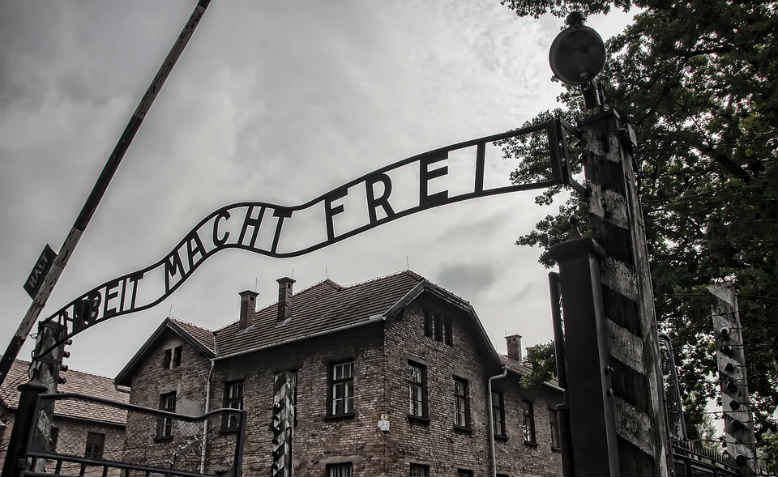 Auschwitz concentration camp. Photo: MaxPixel
Auschwitz concentration camp. Photo: MaxPixel
Remembering the Holocaust means remembering the horrific slaughter of Jewish people, but also the resistance and solidarity, and resolving to put ‘never again’ into practice, writes Dana Mills
Holocaust Memorial Day is a day for contemplation and remembrance but it is also a day to reflect on the relationship between the present, past and future. This is a day to think about how we ensure that the lessons learnt from this day and period of the year are not merely an exercise in historiography, but a daily reminder of what the human species is able to inflict upon itself. As we further in time away from the Second World War, and the slaughter of over 6 million Jewish people, alongside with millions of others who were killed for their sexuality, political beliefs or national denominations becomes harder to engage. The number of survivors is declining, and eye witness accounts are disappearing from our everyday conversations, media and political discourse. Our relationship to the past is continuously reconfigured. And yet the past is inextricably within us every day, as is our relationship to the memory of the Holocaust. This year, more than ever, it feels urgent to rethink the significance of Holocaust Memorial Day in the context of our lived history and contemporary politics.
Holocaust remembrance day is also a day to reflect upon solidarity and its force to counter the evil within humankind. This day is a lesson in the unequivocal calling to speak out for what is right when someone is oppressed. Holocaust Memorial Day is a calling to remember those who stood in solidarity with those whose lives were in danger; this is a day to remember those people who smuggled Jews and helped them escape, who endangered their own lives so that other lives would not be harmed. This is of course also the day to remember and remind the acts of bravery of those who had their death inscribed upon their horizon and yet resisted and tried to fight their oppressors proving time and time again that no human being is ever without agency, whatever course history takes. On this Holocaust Memorial Day, I shall be honouring especially those who took a step forward and resisted evil. And I will be honouring them by keeping their legacy alive.
I am a proud Jewess. My grandmother hails from Königsberg, the hometown of another Jewess, Hannah Arendt, a political theorist whose ideas and writing have inspired my work greatly. Arendt wrote that “The sad truth is that most evil is done by people who never make up their minds to be good or evil.” The histories and the memory of the Holocaust are deeply personal to me. I am alarmed by the rise of the far right, normalisation of racism, and neo-nazi movements becoming centralised and penetrating our lives anew. The first time I saw a swastika in the present rather than in history books was when I was conducting research around Arendt in Bard College, New York. Shortly after the election of Donald Trump to American presidency the far right raised its head and underlying currents of hatred and racism became evident. But at the same time, it was hugely inspiring to see the resistance everywhere to this rise of racism and fascism. The response was immediate and awe making. Then, the second encounter I had with witnessing swastikas in my close surroundings was not so long ago, when swastikas graffiti appeared in Oxford, my adopted home for the past 10 years. This incident occurred merely days after far-right facilitator and architect of the infamous Muslim ban, Steve Bannon, came to speak at the Oxford Union. I was simultaneously sick to my stomach at this reminder of the not- too-too-distant past, and heartened by the opposition to this act of racism and violence, with many dear friends and comrades speaking up and saying no! To this deeply infuriating act.
When I reflect on what it means to say never again, and to stand in solidarity with victims of oppression on this Holocaust Memorial Day, especially as a proud Jewess, I am thinking of those forms of oppressions that the far right is now targeting in its hateful campaigns. Alongside antisemitism, which as Arendt had noted in her work the Origins of Totalitarianism, has been present in Jewish lives for a very long time, I am standing in solidarity with all those targeted for their faith, race, sexuality, gender or all other reasons for oppression. The scapegoating of those most vulnerable in society is maddening and especially on this Holocaust Memorial Day, I say resistance lies in every day acts of remembering and reminding that no one is free until everyone is free.
To say ‘never again’ means to remember the circumstances in which the Holocaust unfolded, that it was a man and woman made event and thus we must actively exercise our agency to prevent it from occurring again. To say ‘never again’ means to take action in our present times to ensure that hatred, violence and oppression against all are eliminated in our lifetime. To say ‘never again’ means to participate in any way possible in withholding the progress of racism and bigotry of all kinds and their creeping into our daily lives. To say ‘never again’ is to remember the Holocaust while fighting against all of those who are oppressed everywhere in our present. To say ‘never again’ means to make it unequivocally clear that we are here on the side of the good, and we are ready to fight evil.

